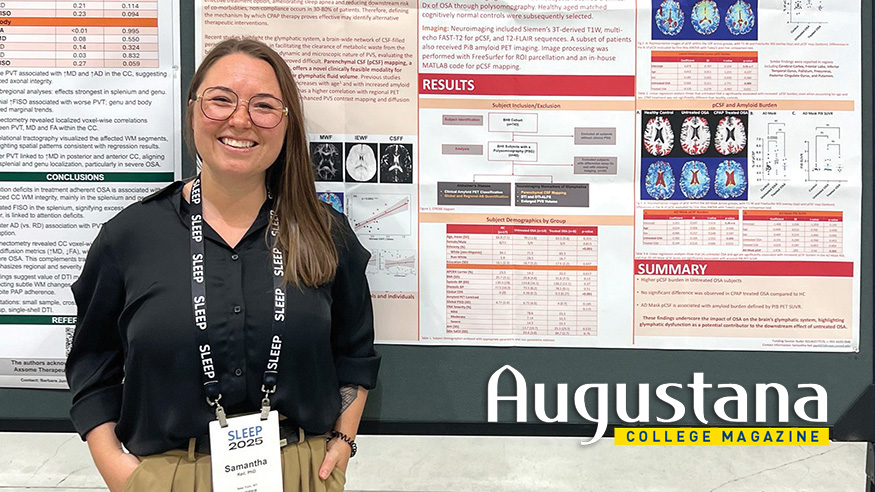2025-26 catalog
SYDNEY ARLIS, Visiting Assistant Professor
B.A., Miami University; Ph.D., University of Iowa
APRIL ARQUILLA, Visiting Assistant Professor
B.A., College of Wooster; Ph.D., University of California - Riverside
TIERNEY R. BROSIUS, Professor
B.S., Wayne State College; M.S., Ph.D., University of Nebraska - Lincoln
KRISTIN DOUGLAS, Associate Dean of the College, Professor
A.S., Waubonsee Community College; B.S., Iowa; M.S., Ph.D., Michigan
KEVIN GEEDEY, Professor, Bohdan Dziadyk Distinguished Chair in Environmental Science and Conservation
B.A., B.S., Ohio State; Ph.D., Michigan State
SCOTT GEHLER, Professor
B.A., Cornell College; Ph.D., University of Minnesota
JACOB GROTHJAN, Visiting Assistant Professor
B.S., Augsburg University; Ph.D., University of Wisconsin-Milwaukee
STEPHEN B. HAGER, Professor
B.A., M.A., California State; Ph.D., New Mexico State
BRADLEY KENNEDY, Assistant Professor
B.A., University of Northern Iowa; M.S., Creighton University
JASON A. KOONTZ, Professor
B.S., Iowa State; M.S., Miami University (Ohio); Ph.D., Washington State
BRITTANY L. MCCALL, Assistant Professor
B.S., Austin Peay State University; M.S., Arkansas State University; Ph.D., Arkansas State University
TIMOTHY MUIR, Professor, Co-Chair
B.A., Kalamazoo; M.S., Ph.D., Miami University (Ohio)
KIMBERLY MURPHY, Professor, Co-Chair
B.A., Winona State; Ph.D., Washington State
DARA L. WEGMAN-GEEDEY, Professor, Robert & Patricia Hanson Endowed Chair of Health & Human Performance
B.S., Mount Union; Ph.D., Delaware
YOUNG YOO, Assistant Professor
B.A., Oberlin College; Ph.D., Northwestern University
Potential majors in biology and the pre-health science advising areas must begin their curriculum with one year of general chemistry (CHEM-131 and CHEM-132), and the major with BIOL-130 and BIOL-140.
NOTE: A student majoring in Biology may not also major in Pre-Medicine.
MAJOR IN BIOLOGY. 32 credits, including three core courses (BIOL-130, 140, 250), an approved 4 credit SI, and 16 elective credits at the 300-400 level. Also 1 year of General Chemistry (CHEM-131 and 132). A student must take at least one of the following courses (BIOL 324, BIOL 343, BIOL 351, BIOL 360, BIOL 362, BIOL 371, BIOL 375, BIOL 386, BIOL 387).
A student who completes a sanctioned SI experience as a requirement of a second major may substitute a non-SI biology course at the 300 level or above for the 4-credit SI experiences listed above, with prior approval granted by the departmental coordinator. A student can count multiple courses from BIOL-464, BIOL-465, BIOL-466 toward the biology major; because the option to enroll in additional SI courses is based on enrollment demands, prior approval must be granted by the departmental coordinator. A student can apply only 2 credits from this list toward the biology major: BIOL-299, BIOL-399, BIOL-499, BIOL-400, BIOL-INTR-xx. Required supporting courses (8 credits): CHEM-131 and CHEM-132 or equivalent. Recommended supporting courses: statistics. Additional recommended supporting courses for students expecting to work toward a M.S. or Ph.D. in the biological sciences: CHEM-321, CHEM-322; MATH-160; PHYS-151, PHYS-152 or PHYS-211, PHYS-212.
MAJOR IN BIOLOGY EDUCATION. 28 credits, including BIOL-130, BIOL-140, BIOL-250, BIOL-310, BIOL-343, One of BIOL-360 or BIOL-362, one of BIOL-386 or BIOL -387; one 4 credit SI experience from biology chosen from BIOL-464, BIOL-465, BIOL-466 or the combination of EDUC-422, EDUC-450 and INTR-EDA90 as part of the Secondary Education program. See the Director of Secondary Education for more details. Required supporting courses (28 credits): CHEM-131, CHEM132, PHYS-151, PHYS-152, ASTR-142, GEOG-105, GEOL-101.
MINOR IN BIOLOGY. 20 credits, including 130, 140, 250, and 8 elective credits at the 300-400 level. Also 1 year of General Chemistry (CHEM-131 and 132). A student can apply only 2 credits from this list toward the biology minor: BIOL-299, BIOL-399, BIOL-499, BIOL-400, BIOL-INTR-xx. Required supporting courses (8 credits): CHEM-131 and CHEM-132 or equivalent.
NOTE ON LABORATORY COURSES: In courses that require a co-requisite lab section, the lecture and lab grades are both factored into the final lecture grade. Successful completion of all BIOL lab courses require registration and a passing grade in both the lecture and lab sections.
Grade Point Average Notation: All courses listed in the catalog as required courses for any major and/or minor, including those courses outside of the department or with a different subject coding, are considered part of the major and will count in the grade point average. Some departments may have additional grade requirements for the courses offered within their department. Recommended supporting courses that are optional and not required may also count in the major depending on the program. For more information see your department chair or the degree requirements for Bachelor of Arts and information on Majors/Minors.
Courses (BIOL)


